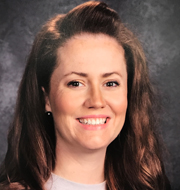
From the Chair: To Serve All, Get Proactive
By Veronica Kirby | March 2024
 As the sun rose over the school campus, Sarah prepared herself for another day of supporting students. With a passion for providing comprehensive services to all, she entered the school building with a sense of purpose. However, as soon as she stepped into her office, Sarah's plans were derailed by a frantic call over the walkie. A student was in crisis, and Sarah was needed immediately. Rushing to the scene, she found a distraught student who was overwhelmed by personal struggles and emotions. Sarah worked to de-escalate the situation, offering a calm presence and a listening ear. After some time, the student began to open up about the challenges he was facing at home and at school. Sarah listened attentively, validating his feelings and offering support. As Sarah helped the student navigate through his crisis, she couldn't shake the feeling of frustration. Despite her best efforts to implement an equitable program for all students, it seemed that the needs of the few were consistently outweighing the needs of the many. She realized that she was caught in a cycle of reactivity, responding to crises as they arose rather than addressing underlying issues proactively.
As the sun rose over the school campus, Sarah prepared herself for another day of supporting students. With a passion for providing comprehensive services to all, she entered the school building with a sense of purpose. However, as soon as she stepped into her office, Sarah's plans were derailed by a frantic call over the walkie. A student was in crisis, and Sarah was needed immediately. Rushing to the scene, she found a distraught student who was overwhelmed by personal struggles and emotions. Sarah worked to de-escalate the situation, offering a calm presence and a listening ear. After some time, the student began to open up about the challenges he was facing at home and at school. Sarah listened attentively, validating his feelings and offering support. As Sarah helped the student navigate through his crisis, she couldn't shake the feeling of frustration. Despite her best efforts to implement an equitable program for all students, it seemed that the needs of the few were consistently outweighing the needs of the many. She realized that she was caught in a cycle of reactivity, responding to crises as they arose rather than addressing underlying issues proactively.This scenario is something that I am sure many school counselors can relate to. I personally remember a particular school where it felt like my walkie would never stop and getting out of the reactive cycle seemed impossible. And yet, that was the year that my co-counselor and I were able to shift gears and create a 50 percent decrease in office discipline referrals. The American School Counselor Association (ASCA) developed the ASCA National Model (2019) and the ASCA Student Standards: Mindsets & Behaviors for Student Success (2021) based on research into the relationship of school counseling to student outcomes, including academic achievement, attendance rates and behavior. A 2012 study by Carey et al. found that schools with comprehensive counseling programs reported higher graduation rates and lower dropout rates. These findings suggest what counselors have been saying for years, that proactive counseling strategies lead to a larger positive outcome for the whole school. Our Florida State legislation even points to the need for serving all students as this phrase is used nine times in the Florida School Counseling Standards (6A-5.079).
So how do we make that shift when we feel stuck in a reactive cycle? To create change it is essential to involve all stakeholders in the process. This includes students, parents, teachers and community members. By soliciting input from diverse perspectives, we can ensure that our services are tailored to meet the unique needs of our school community. My co-counselor and I sat down with our leadership team and discussed school-wide trends and training for staff, got creative with morning news lessons, implemented a new PBIS program with community support for incentives and, most important, found coverage so we could turn off our walkies during group counseling. Ultimately, by being proactive, organized and committed to creating an equitable service model, we can help all students thrive and reach their full potential. Just like my co-counselor and I were able to advocate for a comprehensive program for all students that decreased discipline by 50 percent, it is our responsibility as school counselors to advocate for the resources and support necessary to ensure that every student receives the assistance they need to succeed.
Contact Veronica Kirby, FSCA Board chair, at kirby@fla-schoolcounselor.org.